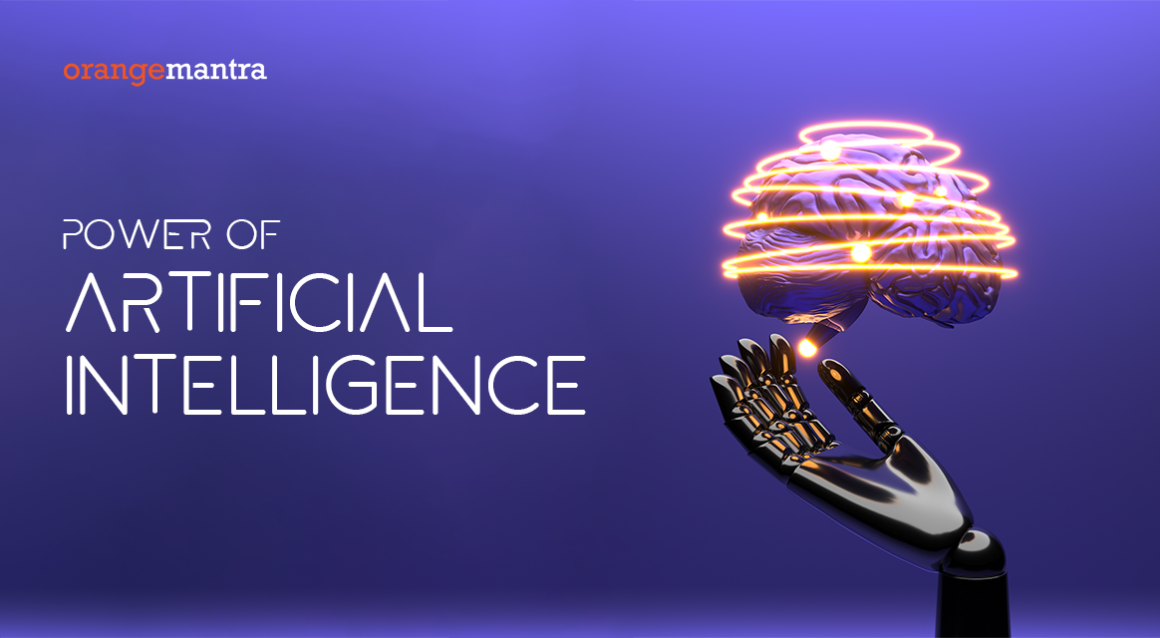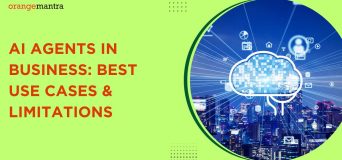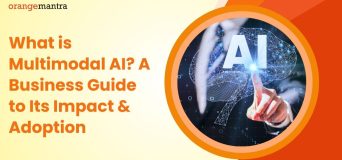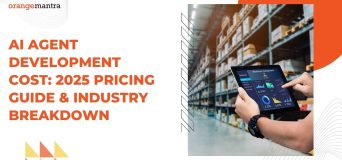The power of Artificial Intelligence is expressed in terms of rapid analysis of large data sets in a matter of minutes and automated mundane and repetitive tasks with the highest possible efficiency. All this is helping businesses across industries in pushing boundaries with AI. They are saving time, money, and, more importantly, human resources, resulting in exponentially higher efficiency with better quality and less time.
Tell me, how much time do you need to go through the data on the weather conditions of the past hundred years? Also, you don’t just need to read it; you should memorise it, identify patterns, make connections and be prepared for any question related to the data.
Your answer would be in days, if not months. But what if you are given a few minutes? You will clearly deny it, won’t you? How about a technology that can do it for you in a matter of minutes, if not seconds?? Sounds unbelievable? Believe it. It is AI.
Artificial intelligence (AI) is the most powerful technology ever developed. Hands down.
In today’s discussion, we will talk about this amazing aspect of AI and how it is revolutionising every industry across the spectrum.
Power of Artificial Intelligence Innovation is Felt Across industries
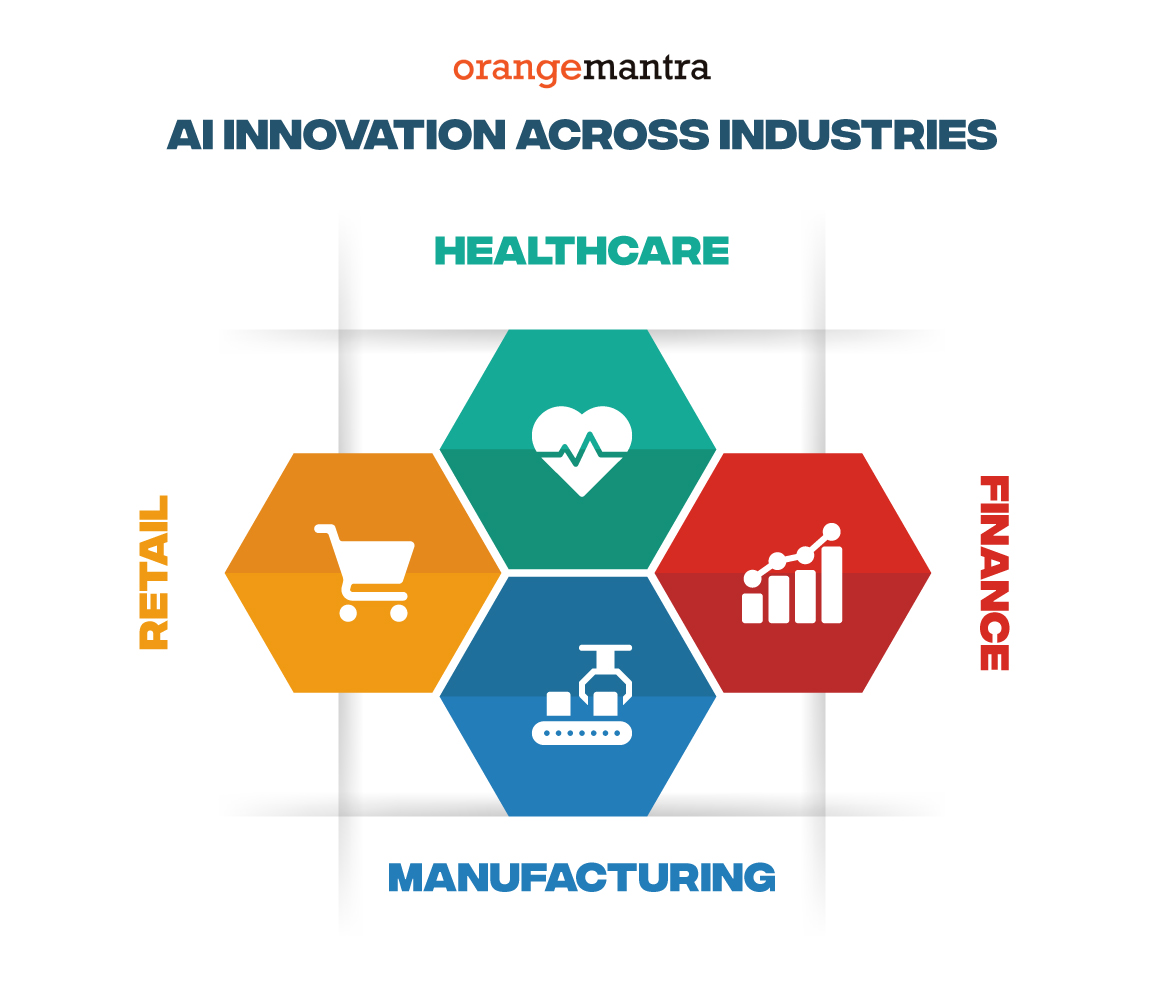
Till now, humans were the only intelligent beings walking the earth, capable of learning, analysing, predicting, reasoning, bringing creativity and doing all the other tasks that require high-level cognitive ability. AI has challenged the very core of human supremacy.
Going beyond any machine ever built, AI is taking on tasks that were, until now, reserved for humans. Moreover, it is revolutionising not only technology and businesses but introduces AI innovation in our daily lives. In fact, AI is not working on efficiency that transcends human limitations
Pushing boundaries with AI, healthcare, education, manufacturing, retail, and all other businesses are propelling automation in industries and augmenting our understanding of data in ways once deemed impossible. This has unlocked new capabilities and limitless possibilities with AI that appeared impossible until now. Let’s see some examples across industries.
1- Better Patient Care and Diagnosis in Healthcare
AI uses machine learning algorithms that analyse vast amounts of medical datasets. This way, it identifies patterns, makes accurate predictions, and assists in tasks such as diagnosis and treatment identification.
Artificial intelligence and machine learning development engineers play a crucial role in developing and refining the algorithms that power such AI analysis.
They bring AI transformation by creating models that accurately identify patterns, make health-related predictions, and assist in tasks like disease diagnosis and treatment recommendations.
This helps healthcare professionals reach accurate decisions, improve patient care, and offer treatment services, leading to enhanced overall healthcare delivery and patient well-being.
2- AI-powered predictive Analytics for high Financial Returns
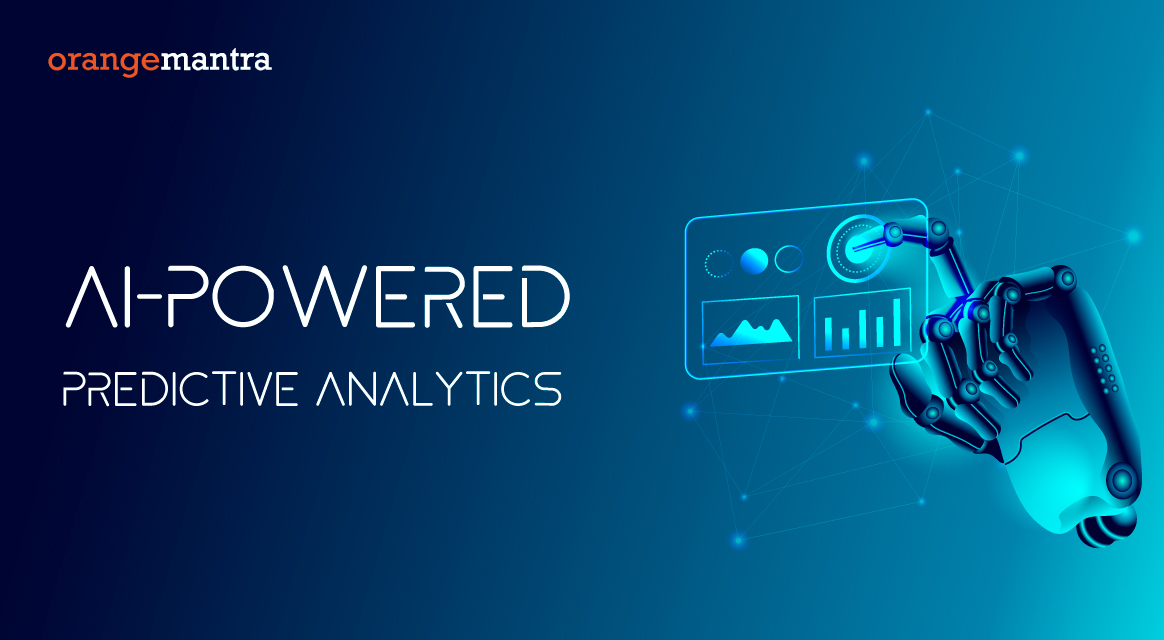
Similarly, in the finance sector, AI analyses historical data, identifies trends, and makes data-driven predictive analytics. This leads to sharpened investment strategies, proactive fraud detection, and providing personalised financial insights for better decision-making by financial professionals.
Moreover, it goes one step ahead. It offers algorithmic trading that uses real-time data to automate decisions, improve trading efficiency, optimise portfolio performance, and respond to market fluctuations. All these lead to investors maximising their financial returns.
3- Reducing Maintenance Costs and Downtime in Manufacturing:
For manufacturing, AI joins forces with IoT development services and its vast network of sensors to accelerate production processes, predict equipment failures and enhance overall operational efficiency.
This AI transformation helps the manufacturing business ensure that the facility runs at its peak capacity every time with little to no disruption, as proactive maintenance minimises downtime, reduces costs of maintenance, increases equipment lifespan, and ensures a smoother and more reliable manufacturing workflow.
4- Data-driven Demand and Supply Maintenance in Retail
Pushing the boundaries with AI in sales, the retail business is employing recommendation algorithms based on user behaviour. It analyses users’ past purchasing patterns and preferences and tailors personalised product suggestions to individual customers. Since modern day customers crave personalisation, this AI-led high-level personalisation leads to higher sales than ever before.
Moreover, the machine learning development company models analyse historical data for accurate demand forecasting, helping retail businesses perfect their inventory management, reduce overstock and stockout instances, and develop the more efficient supply chain that every retail business seeks.
5- Adaptive Learning for Individualised focus on Student
With the ability to converse like humans, AI is revolutionising education. It uses NLP solutions to facilitate interactive and personalised learning experiences, leading to better learning outcomes. It engages students in more natural and effective communication with educational technologies like LMS, online education platforms, etc., thereby making education more personalised and adaptive to the particular student’s needs.
One of its best offerings is the adaptive tutoring system, which dynamically adjusts to individual student performance, i.e., tailors the learning experience in real-time as per the strengths and weaknesses of every student.
For instance, if a student excels in a subject, the system may advance to more challenging concepts of the same subject and keep their interest alive rather than boring them with concepts that could become redundant and dull over time.
On the other hand, with the power of artificial intelligence students will get extended support in areas where they struggle and need special assistance. This infuses personalised and efficient learning and guarantees a better learning outcome.
These are just a few examples of how powerful AI is when it comes to bringing about real disruption in any industry. However, there are nuances that pose questions. Let’s look into them
Ethical AI: With Great AI power of Artificial Intelligence, comes great Ethical Considerations
As with any power, there must be some ethical considerations, guidelines, and moral principles associated with AI usage that should be adhered to. This is necessary to ascertain that AI development solutions contributes positively to society and minimises the potential harm that could be possible.
-
AI Innovation is amazing but sometimes it may Be biassed
AI learns from data on human, gathered by humans. Since humans possess unknown or unacknowledged biases, these could also flow into AI systems. you can explore human intelligence vs artificial intelligence to know more about this.
Let me explain.
If the training data contains biases or reflects existing societal inequalities, the AI model will inadvertently learn and replicate those biases. These biases will reflect in its predictions or decisions leading to discrimination or unfair treatment on the basis of race, gender, or other factors.
AI may even amplify the disparities by essentially generalising the biassed data, leading to discriminatory outcomes when applied to real-world scenarios.
Therefore, AI engineers should ensure unbiased and diverse training data to mitigate the risk of perpetuating and amplifying existing biases in AI systems.
-
Difficult to Spot and Remedy Issues due to Transparency
Despite limitless possibilities with AI, these algorithms lack transparency in how decisions are made. This makes it difficult to identify errors, biases, or potential risks in AI systems.
The reason is that AI algorithms are a product of complex and intricate mathematical processes. To spot the epicentre of the issue, one would need to enter a complex web of interconnected mathematical components.
Not only is it time-consuming, but this may even worsen the existing problem than correcting it. Even worse, it may even develop a new problem altogether.
Moreover, this gets even more complicated with advanced algorithms like deep neural networks.
This reduces user trust, hinders accountability, and raises ethical concerns. This is due to the fact that a lack of understanding in AI decision-making processes may lead to unintended consequences or biassed outcomes.
For example, there could be instances where loan approvals or job recruitments are biassed against certain demographics and businesses using these AI solutions may not be aware of this, and even if they are, they may not find a way to remedy it.
Therefore, it’s crucial to prioritise transparent AI systems for responsible development and usage. Some Artificial Intelligence engineering ways to achieve this include providing clear explanations of AI decisions, Regularly auditing algorithms for biases,Involving diverse perspectives in the development process.
-
Access to Personal Data leads to Privacy Issues
Further, AI systems are often trained on large amounts of personal data. This raises concerns about privacy infringements. The widespread use of personal information may get into the wrong hands, who, in turn, gain unauthorised access or misuse it in more than one way.
Take the case of an AI system trained on healthcare records. It has access to the personal as well as medical data of a patient and if the system isn’t properly secured, any unauthorised individuals, like hackers or others with malicious intent, may gain access to sensitive information and use it to perpetrate crime.
This violates privacy as the perpetrators can execute identity theft, fraudulent activities, or even sell sensitive medical information on the black market.
-
Autonomous Systems May Struggle With Moral Decision-Making
Ethical dilemmas arise when AI systems in autonomous vehicles or healthcare make critical decisions without human intervention. See, AI does not possess a sense of morality; it only knows algorithms. For them, determining the morally right course of action can be very challenging, if not possible.
Understand this with this example. In the case of autonomous vehicles, if a collision occurs, then the AI must make split-second decisions. It has to prioritise the safety of the vehicle occupants, pedestrians, or other vehicles.
This raises serious ethical implications for AI breakthroughs in innovative spaces like the said one. It questions how the AI should weigh different lives and make decisions aligned with social values. Navigating the human-AI relationship is key here.
The future of AI Innovation: Possibilities and Concerns
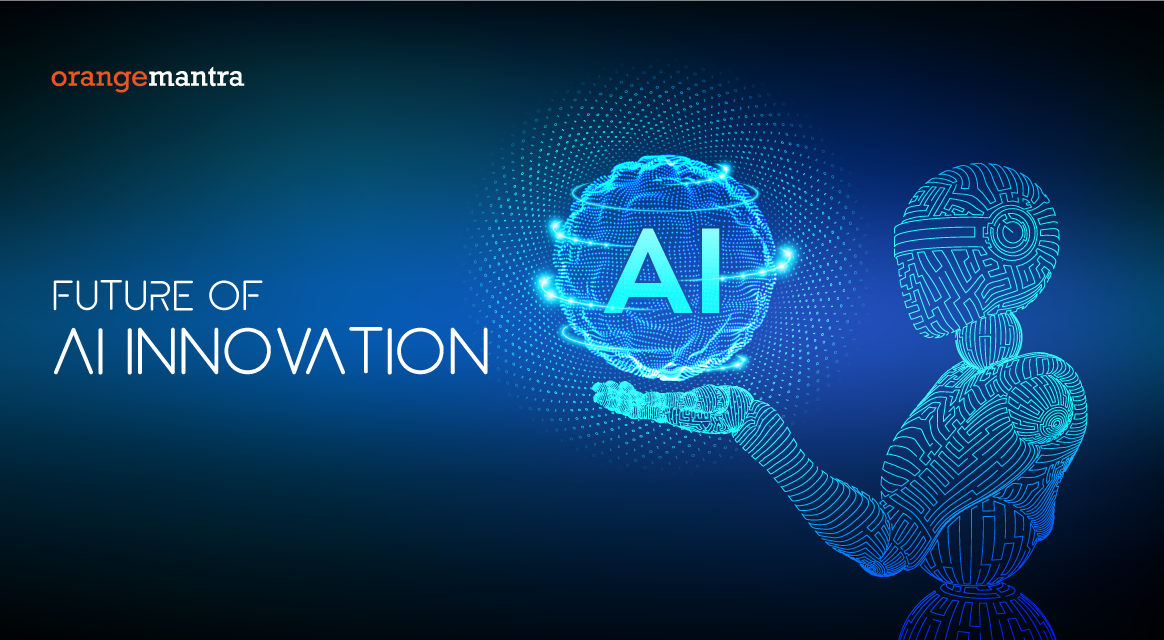
Despite all these concerns, the future of artificial intelligence holds immense promise. It has a huge potential for transforming each and every sector it enters.
The technology continues to evolve, and not too much time is left before AI will play a pivotal role in solving complex problems and driving innovation.
We have already discussed how AI transformation is taking on industries such as finance, healthcare, retail, and others.
AI will revolutionise how we work, live, and interact. The anticipated developments include sophisticated natural language processing, computer vision, and personalised experiences on various fronts.
And these are not limited to traditional industries; AI is rapidly transforming innovative industries such as ai in automobile, robotics, space exploration, and beyond.
There are limitless possibilities with AI. The complex algorithms already revolutionizing transportation with intelligent, self-driving cars. They ensure the highest level of safety through real-time decision-making.
Similarly, AI’s ability to learn and adapt will power machines, leading to advancements in manufacturing and even domestic settings.
Moreover, AI is far more important in areas like space exploration. Its ability to scan large data sets will lead to accurate and faster calculations that will benefit mission planning, navigation, and discovery.
As AI continues to evolve, its impact on these cutting-edge sectors is poised to redefine the possibilities of technology, offering efficiency, precision, and novel capabilities across diverse domains.
Conclusion: Building a responsible AI-powered world
So, we have discussed all about the Power of Artificial Intelligence and AI has arrived and it is here to stay, evolve and transform the human evolutionary journey once and for all.
AI impact across industries is visible, whether traditional or emerging companies such as automated vehicles or space exploration. Its capability to automate time-consuming tasks that had little to no value is expediting operations across businesses. And as far as ethical dilemmas are concerned, it is just a matter of time when responsible enterprise AI development will be overcoming limitations with AI.
Smart people are those for believe in the certain advent of AI-powered future and will make the first move now to integrate it into their business and experience the untamed power. It will execute tasks in minutes that used to take days and simplify complex problems with ease.
Frequently Asked Questions
1- How powerful is AI?
The power of Artificial intelligence has reached a point where it can perform humanised tasks. Businesses are pushing boundaries with AI with its ability to read, learn, analyse and memorise hundreds of years of data in a few minutes. It is so good at it that once it is done, you can ask it any question and it will provide an answer with the utmost precision.
2- Will AI steal your jobs?
No, AI innovations will not steal your jobs. It will only ease your job. However, if you stop improving yourself, then the person who knows how to use AI will replace you in the near future. To be part of an AI-powered future, you need to stay updates and keep improving.
3- Can AI take over the world?
Yes, but only in a Hollywood movie or in very-very distant future that you should not be bothered about.
4- What are the pros of AI?
AI offers multiple benefits:
- Speed
- Accuracy
- Uniqueness
- Easy natural
- Natural interaction
- Continuously evolving
This will bring an AI-powered future where quality and quantity reside together.
5- What are the cons of AI?
Despite so many powerful AI innovations, there are certain negatives. These are:
- Privacy intrusion
- Biasness
- Ethical dilemma
However, advancements in the direction of overcoming limitations with AI are underway in full capacity.
6- Does AI threaten human creativity?
No, advancement in technology has led to pushing boundaries with AI but it does not mean that it would threaten human existence, with continuous development on aspects such as ethical AI, AI and humans would share this space harmoniously. So, there are limitless possibilities with AI but overtaking the world is not amongst them.
